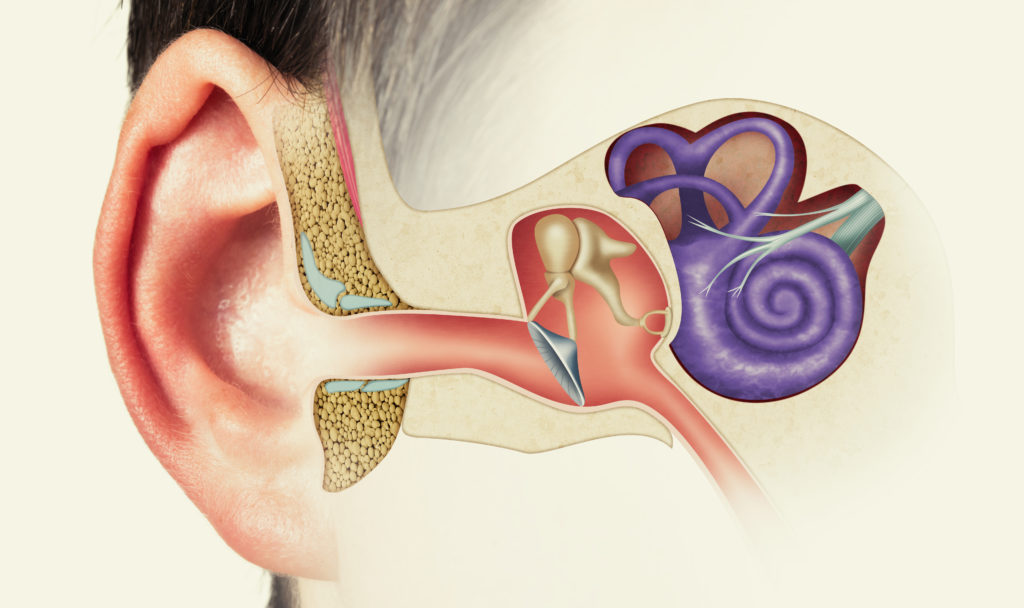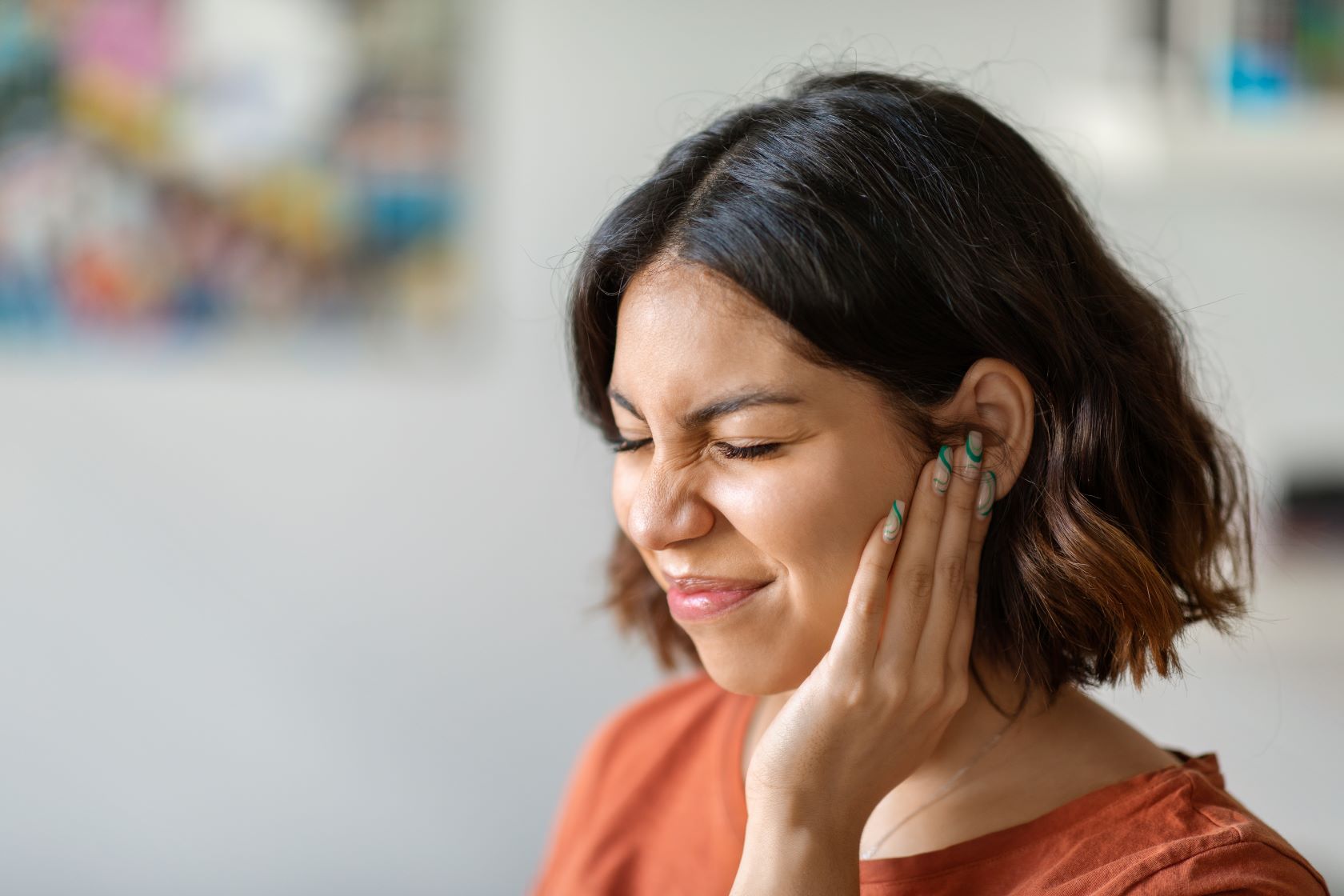Tinnitus is a common ailment affecting millions of people worldwide. It is often described as a ringing, buzzing or whooshing sound within the ear or head, and it can be an incredibly frustrating condition to live with.
Understanding what can bring on the onset of tinnitus can help you manage and potentially prevent it. In this blog, we’ll explore the factors that lead to tinnitus, from exposure to loud noises and underlying health issues to the roles of stress and certain medications.
Understanding the ear structure and noise exposure
One of the most common causes of tinnitus is prolonged exposure to loud noises. To understand how noise exposure affects the ear and leads to tinnitus, it’s important to understand the ear’s structure and how it handles sound.
The ear consists of 3 main structures; the inner ear, middle ear and outer ear. The outer ear captures sound waves and directs them to the eardrum. The middle ear contains three tiny bones that amplify sound vibrations to the inner ear which houses the cochlea, filled with fluid and tiny hair cells that convert vibrations into electrical signals sent to the brain.
When exposed to excessive volumes, the hair cells in the cochlea become damaged. These important cells do not regenerate, and this damage can result in hearing loss and tinnitus.

What can cause noise-induced tinnitus?
Noise-induced hearing loss and tinnitus come in two forms:
- Continuous exposure which is frequent exposure to moderate noise levels, like in industrial settings. This can gradually damage the hair cells.
- Acute exposure which is sudden loud noises, such as explosions or gunshots, can cause immediate and severe damage.
Noise exposure can come from many different sources, from occupational hazards, recreational activities and sudden, and often unexpected, loud sounds.
Jobs that involve consistent exposure to loud machinery, such as construction, manufacturing or airport ground operations, can damage the delicate structures within the ear. It is your employer’s responsibility and legal duty to provide ear protection, and if the daily noise level exceeds 85dB, the law states that ear protection must be worn.
Going to loud concerts and nightclubs, or using personal audio devices at high volumes, can also contribute to hearing loss and tinnitus. Most modern phones and listening devices will have a volume limit that you can set to avoid listening to music at too high of a volume.
Explosive sounds such as fireworks or gunshots can cause immediate and sometimes permanent hearing impairment, leading to tinnitus.
How can tinnitus from excessive noise exposure be prevented?
It’s said that prevention is better than cure, and that could not be more true when it comes to noise-induced ear damage. Given that exposure to loud noises is a leading cause of tinnitus, taking proactive steps to protect your ears can make a significant difference.
Using ear defenders or earplugs can help protect your ears from excessively loud sounds and are ideal for work and leisure activities. For personal listening devices, opting for noise-cancelling headphones can help you hear your music clearer without the need for turning up the volume higher than what is considered safe.
As well as these options, you should also consider reducing the time you spend in loud environments and taking frequent breaks when possible. Being mindful of how high the volume is on your television or personal listening device can also help protect your hearing and prevent the onset of tinnitus.
Preventing noise-induced tinnitus requires a combination of personal responsibility and protective measures. By using hearing protection, limiting exposure to loud sounds and implementing noise control measures, you can significantly reduce the risk of developing tinnitus.
Taking these proactive steps will help maintain your hearing health, however, if you already experience tinnitus, we’re here to help. Book an appointment with a hearing specialist and we can talk to you about tinnitus management.

Health conditions that can lead to tinnitus
There are several health conditions linked with tinnitus, which highlight the intricate connection between physiological and pathological factors.
- Age-related hearing loss (presbycusis) and noise-induced hearing loss are primary contributors, as damage to the inner ear structures can result in the perception of phantom sounds.
- Ear infections and blockages, such as those caused by earwax buildup, can create pressure in the ear, leading to tinnitus. Meniere’s disease, an inner ear disorder characterised by vertigo, hearing loss and tinnitus, is thought to be related to abnormal fluid pressure in the ear.
- Temporomandibular joint (TMJ) disorders which affect the joint connecting the jaw to the skull, can also cause tinnitus due to their proximity to the ear structures.
- Cardiovascular diseases, including hypertension and atherosclerosis, can lead to pulsatile tinnitus, where the sound of the heartbeat is heard in the ear.
These conditions, among others, emphasise the importance of thorough health checks to identify and address the underlying causes of tinnitus.
The connection between stress and tinnitus
Stress and anxiety can exacerbate tinnitus symptoms. While stress does not directly cause tinnitus, it can heighten the perception of the sound and make it more annoying. This creates a vicious cycle where tinnitus causes stress, and stress, in turn, makes the tinnitus seem worse.
Stress management techniques such as mindfulness, relaxation exercises and cognitive-behavioural therapy can be effective in reducing the impact of tinnitus.
How medication can cause tinnitus
Some medications can cause tinnitus. This is a condition known as drug-induced ototoxicity, where certain medications negatively affect the inner ear or auditory nerve pathways.
Ototoxic medications include certain antibiotics, chemotherapy medications and loop diuretics, all of which can damage the delicate hair cells in the cochlea that are essential for hearing.
Non-steroidal anti-inflammatory drugs (NSAIDs), such as aspirin and ibuprofen, can also induce or exacerbate tinnitus, especially at higher doses. Some antidepressants and antimalarial tablets have been linked to tinnitus as well, though these cases are less common.
The risk of tinnitus increases with the dosage and duration of these medications, making it crucial for individuals to consult with their GP about potential side effects and explore alternative treatments if tinnitus symptoms develop.

Lifestyle factors that can lead to tinnitus
Lifestyle factors such as smoking and being overweight can significantly contribute to the development and exacerbation of tinnitus. Smoking introduces toxins that can impair blood flow to the inner ear and damage its delicate structures, leading to hearing loss and tinnitus.
Nicotine and other chemicals in cigarettes can also disrupt neurotransmitter activity, which may affect the auditory system. Being overweight is often associated with cardiovascular issues such as hypertension and atherosclerosis, which can lead to poor blood circulation to the ear and result in pulsatile tinnitus, where the sound of the heartbeat is perceived in the ears.
These lifestyle factors can compound other risks and make individuals more susceptible to tinnitus, highlighting the importance of maintaining a healthy lifestyle to support overall auditory health.
The best way to manage tinnitus
No matter the cause, managing tinnitus with hearing aids can be highly effective, particularly for those who also suffer from hearing loss. Hearing aids boost external sounds, which can mask the noises associated with tinnitus, making them less noticeable.
Modern hearing aids often come equipped with tinnitus masking features, such as built-in white noise generators or customisable soundscapes that provide additional relief by creating soothing background sounds.
By improving your overall hearing, hearing aids can also reduce the strain on the auditory system, which helps decrease the intensity of tinnitus. Many hearing aids are integrated with smartphone apps, allowing users to adjust settings and personalise their tinnitus management programs conveniently.
Using hearing aids not only enhances communication and the quality of life, but also helps you better manage the persistent and distracting sounds of tinnitus. If you think you could benefit from hearing aids to manage your symptoms of tinnitus, book your hearing test and chat with us today.

